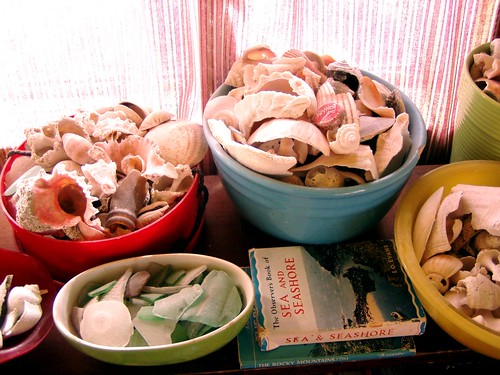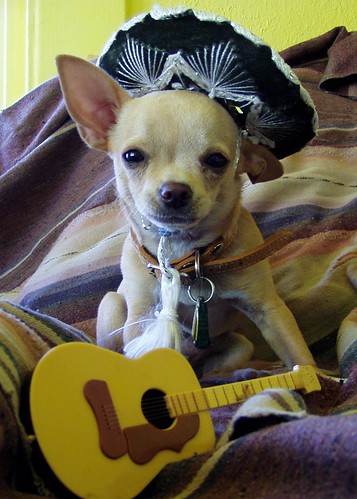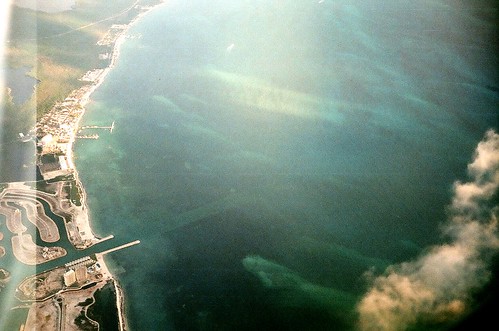
Real Mexican
The Noise
The Outs-March 2010
Ellen Jo Roberts
In my next life I want to come back as a Mariachi. They have such zest and good cheer, wear such dashing outfits, and get paid big bucks to whistle like jilguerillo birds.
“Hello from Mexico where I have collected a slight sunburn, a small bag of sea shells, some tequila souvenirs for pals, and many photographs. The locals are all congenial, and they all tell me I speak with a Norteňo accent.”
Recently, I went to Cancun for a friend’s wedding. Cancun was an invention of the Mexican government in the 1960s, developed as a tourism location. Along the Caribbean Sea in the Yucatan, it’s a Mexico unfamiliar, much different than our desert Mexico out west. Where our neighbor, Sonora, is dry, mountainous, dusty, full of cactus, and American retiree RVs, the Yucatan peninsula is green, tropical, flat, low elevation lush, and full of hard-bodied international 20-somethings, dancing ‘til dawn.


I’ve been to Mexico about 9 or 10 times now. A passport did not used to be required to drive across the border, but as of June 2009, tightening travel restrictions demand it. Arizonans frequently head to Mexico for lower priced prescriptions and dental work. We go there for amusement and adventures.

The first time we went to Mexico was a trip down the Baja California peninsula, to Ensenada, in 1997. We were alarmed at the confusing lack of street signs, and the abundance of litter. Thieves stole a bag of rubber rafts and a bike pump from our Toyota. We ate fish tacos at a street corner stand for every meal, drank cheap Kahlua and slept in our truck on the beach every night.
The Pacific was big, grey and cold. After dark, glowing green phosphorescent algae illuminated each crashing wave, like a most magical fireworks show.

Not long after the foray into Baja, we discovered a closer coastal town, Puerto Peñasco, Sonora. Also known as “Rocky Point”, it’s a Spring Break mecca to thousands of Arizona college students, being a mere 3 hour drive from metro Phoenix (even faster if you’re a lead foot). There’s an incredible tidal fluctuation where the Sea of Cortez meets Puerto Peñasco— revealing anywhere from 30 to 300 feet of shoreline, and amazing tidal pools brimming with wee creatures.
We spent many years escaping to those beaches, staying in cheap motels where you couldn’t flush the toilet paper, riding bikes to the beaches, kayaking, snorkeling, collecting shells, chatting with friendly locals and shrimp fishermen.


Puerto Peñasco is home to “C.E.D.O”., a renowned center of study for aquatic mammals of the Sea of Cortez, especially a rare and endangered cetacean, a type of short nosed porpoise known as the Vaquita, native only to these waters. Over the years, Puerto Peñasco has both prospered and suffered from its proximity to the U.S. The formerly small fishing community is now overrun by luxury high-rise time shares, and desert golf resorts. Technically, foreigners are not allowed to own property in Mexico, especially not near the coast. However, an elaborate round-about way via second parties and bank trusts does allow it, unfortunately making Mexico more American by the minute.
One must get further and further away from the border to find the real Mexico.

Our Baja Bug once ran out of gas outside of Sonoita. We had to push the car along the highway, singing to the Kinks on the tape deck until some Phoenix dude in a toy hauler stopped, and sold us a couple of gallons to get us into town.

Another time on the same road while returning from a Sonoran adventure with amigos, about 40 kilometers shy of the Arizona border, all of the truck’s dash warning lights lit up like Christmas. Much shouting, and distressed profanities as we pulled over to the roadside. It was July and a relentless 111 degrees. Luckily for us, we were near a small ranch house, the only structure for many miles. The woman who answered the door was named Socorro. My friend Hilda and I chatted with her, while Chad and Lucio attempted to remedy the Toyota’s problems. Seems the air-conditioning belt had sprung loose and hopped right into the engine’s fan belt. Everything was wedged tight. The situation seemed dire. Our lack of proper tools was foolish. At one point Lucio was wielding a giant rock, poised over the hot engine like a deranged caveman. Socorro asked us what we needed. We explained that if only we had a new fan belt we could just cut all that tangled mess out and replace the one belt most vital. She led us to her backyard, where a mesquite tree was covered with an assortment of fan belts in every size, dangling like delicious fruit in front of my teary eyes. We gave her $20 American dollars and a giant head-sized mango from our cooler, and soon we were back on the road home. Perhaps it’s only fitting that “Socorro” translates literally as “help” or “assistance.”
We snapped a photo of Socorro. Americans are always very smiley in photos, but as customary with “Real Mexicans”, Socorro did not smile. Instead she remained stoic, same as two of her young grandchildren standing with her, all three looking so serious.

I got schooled on “Real Mexicans” during the many years of my Arizona life spent working at hotels and resorts, with Mexican immigrants, both legal and not quite so legal. Some days I barely spoke English at all, and I loved it. I even started to think in Spanish. It is a time fondly remembered and I am forever grateful for all I learned. The Mexicans were surprised I could handle it, working so hard, side by side with them, but I changed their perceptions of Americans, just as they enlightened me to their Mexican ways. First off, they all thought I was typically “American” for wanting 2 days off a week. Most of them worked at least 2 or 3 jobs, and thought Americans were lazy.
“I am like an American today,” my friend Hilda joked with me, “Staying at home, under the covers, watching TV!” Hilda, a Jalisco native, has always encouraged me, telling me if she could be a success in a foreign country I had no proper excuse not to succeed in my own native land. Mexicans like to work hard. They don’t want to discuss it; they just want to do it. Americans are too enamored with lengthy meetings, chatter, and creating too many pieces of paperwork.

Mexicans like to give funny and insulting nicknames to each other. The little skinny-legged guy was Apėnas salir de un huevo, or “just hatched from an egg”. The drunk was Gusano Muerto, the dead worm in the bottom of the mescal bottle. The lady with the goofy walk and the big nose was La Guacamaya, some type of equally silly-looking bird. The really old guy was Listo Para Morir (Ready to Die). The woman with the large butt was known as simply as “Big in the Back”. “Mexican men like the ‘big in the back’ ladies,” they explained.
I had myriad nicknames, all alluding to my gigantic stature, including Macedona (which I think translates to “mastodon”), and Grandota. “Mėndiga” was another one, meaning too sneaky or clever for my own good. I learned that they only gave nicknames to people they liked.
It was an honor. If they didn’t like you, they didn’t even bother.
As serious as a Real Mexican could be in a photo, it was completely the opposite in life: joking, goofing, jovial all the time. It always confounds me that the Arizona government considers Mexican immigrants equivalent to terrorists. There has got to be a better way to handle the situation along our borders.

On my most recent trip to Mexico, I was traveling alone, moving from airport to airport, shuffling along in lines with strangers. By the end of my trip, my thoughts became clear and concise in the way they only can while traveling alone. Thinking more than speaking. Looking out on the world from 30,000 feet up. Observations become crystalline. Mexico, an amazingly varied landscape full of wonderfully warm people, incredible art, music, history, is often thought of as being corrupt, dangerous, violent, impoverished. Sure, it is all of these things, but there’s so much more to the story. Our lives here, al otro lado (on the other side of the border), are equally complex. In fact, compared to the way things are going in the U.S., Mexico doesn’t actually seem quite so mismanaged anymore. Maybe I’ll move there.
In my next life, as a Mariachi.

Ellen Jo Roberts was born in Illinois (1972). She lives in a historic Clarkdale Arizona house (1914) and drives a yellow car built in Germany (1973). She is married to Bike Daddy Chad (Illinois 1972). They share their home with assorted pets born in the 21st century. Read all about it at ellenjo.com

Great piece Sheck. U R to writing as Alanis is to Singing. Isn't that ironic?
ReplyDelete